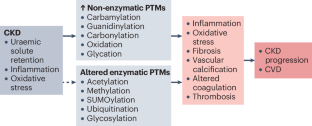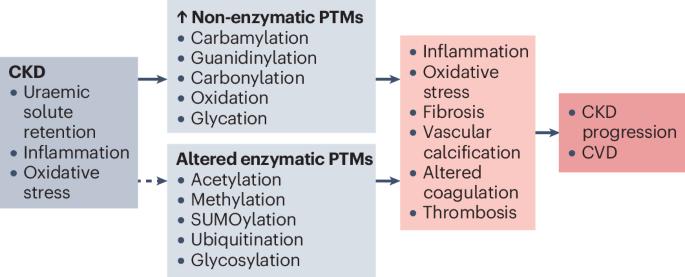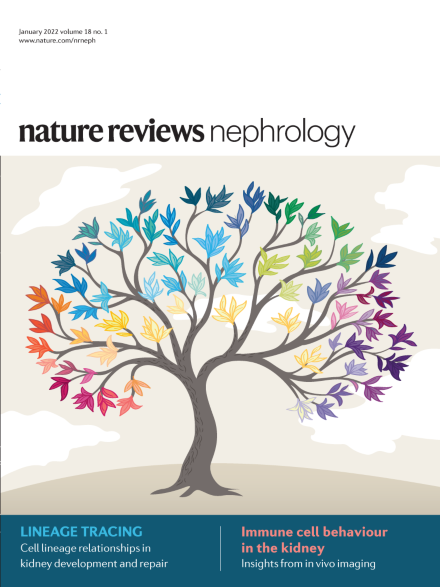Post-translational modifications in kidney diseases and associated cardiovascular risk
IF 28.6
1区 医学
Q1 UROLOGY & NEPHROLOGY
引用次数: 0
Abstract
Patients with chronic kidney disease (CKD) are at an increased cardiovascular risk compared with the general population, which is driven, at least in part, by mechanisms that are uniquely associated with kidney disease. In CKD, increased levels of oxidative stress and uraemic retention solutes, including urea and advanced glycation end products, enhance non-enzymatic post-translational modification events, such as protein oxidation, glycation, carbamylation and guanidinylation. Alterations in enzymatic post-translational modifications such as glycosylation, ubiquitination, acetylation and methylation are also detected in CKD. Post-translational modifications can alter the structure and function of proteins and lipoprotein particles, thereby affecting cellular processes. In CKD, evidence suggests that post-translationally modified proteins can contribute to inflammation, oxidative stress and fibrosis, and induce vascular damage or prothrombotic effects, which might contribute to CKD progression and/or increase cardiovascular risk in patients with CKD. Consequently, post-translational protein modifications prevalent in CKD might be useful as diagnostic biomarkers and indicators of disease activity that could be used to guide and evaluate therapeutic interventions, in addition to providing potential novel therapeutic targets. Chronic kidney disease (CKD) is associated with several alterations in protein post-translational modifications. Here, the authors examine the evidence of these alterations, their links with CKD progression and cardiovascular risk in patients with CKD, and their potential clinical applications.


肾脏疾病中的翻译后修饰及相关心血管风险
与普通人群相比,慢性肾脏病(CKD)患者的心血管风险更高,这至少部分是由与肾脏病独特相关的机制造成的。在慢性肾脏病患者中,氧化应激和尿潴留溶质(包括尿素和高级糖化终产物)水平的增加会增强非酶翻译后修饰事件,如蛋白质氧化、糖化、氨甲酰化和鸟苷酰化。在慢性肾功能衰竭中还可检测到酶翻译后修饰的改变,如糖基化、泛素化、乙酰化和甲基化。翻译后修饰可改变蛋白质和脂蛋白颗粒的结构和功能,从而影响细胞过程。有证据表明,在慢性肾脏病中,翻译后修饰的蛋白质可导致炎症、氧化应激和纤维化,并诱发血管损伤或促凝血栓作用,这可能会导致慢性肾脏病进展和/或增加慢性肾脏病患者的心血管风险。因此,在慢性肾脏病中普遍存在的翻译后蛋白质修饰可能是有用的诊断生物标志物和疾病活动指标,除了提供潜在的新治疗靶点外,还可用于指导和评估治疗干预措施。
本文章由计算机程序翻译,如有差异,请以英文原文为准。
求助全文
约1分钟内获得全文
求助全文
来源期刊

Nature Reviews Nephrology
医学-泌尿学与肾脏学
CiteScore
39.00
自引率
1.20%
发文量
127
审稿时长
6-12 weeks
期刊介绍:
Nature Reviews Nephrology aims to be the premier source of reviews and commentaries for the scientific communities it serves.
It strives to publish authoritative, accessible articles.
Articles are enhanced with clearly understandable figures, tables, and other display items.
Nature Reviews Nephrology publishes Research Highlights, News & Views, Comments, Reviews, Perspectives, and Consensus Statements.
The content is relevant to nephrologists and basic science researchers.
The broad scope of the journal ensures that the work reaches the widest possible audience.
 求助内容:
求助内容: 应助结果提醒方式:
应助结果提醒方式:


